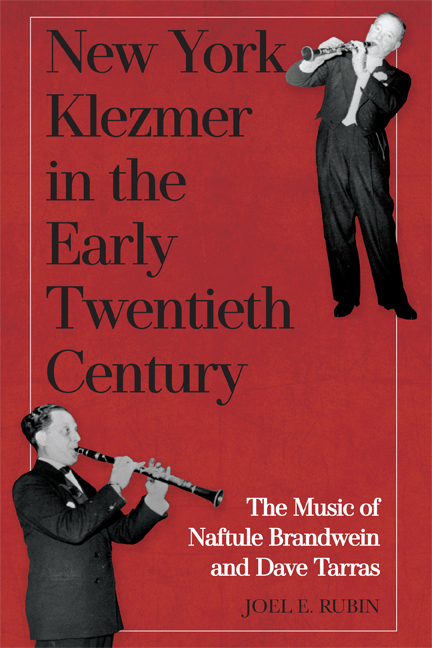Book contents
- Frontmatter
- Contents
- Acknowledgments
- List of Abbreviations
- Note on Orthography and Transliteration
- About the Companion Website
- Introduction: “If You Called Me A Klezmer Thirty-Five Years Ago …”
- 1 A Wedding in Town Was Like a Holiday: A Short History of Klezmorim in Europe
- 2 Klezmer in New York: Changing Meanings, Changing Contexts
- 3 A Kind of “Ethnomusicological Archive”: Commercial 78-rpm Recordings of Klezmer Music
- 4 A Single Field Irrespective of Origin: Polymusicality and Language, Aesthetics, Classification, and Transcription
- 5 “What Mattered Was What’s Happening with the Tune”: Modality and Compositional Processes
- 6 “The Little Things That They Do”: Ornaments and Performance Practice Techniques
- 7 “The Newest Bulgar Out That Everyone Played”: New York Klezmer after 1929
- Glossary
- Notes
- Bibliography
- Index
5 - “What Mattered Was What’s Happening with the Tune”: Modality and Compositional Processes
Published online by Cambridge University Press: 11 September 2020
- Frontmatter
- Contents
- Acknowledgments
- List of Abbreviations
- Note on Orthography and Transliteration
- About the Companion Website
- Introduction: “If You Called Me A Klezmer Thirty-Five Years Ago …”
- 1 A Wedding in Town Was Like a Holiday: A Short History of Klezmorim in Europe
- 2 Klezmer in New York: Changing Meanings, Changing Contexts
- 3 A Kind of “Ethnomusicological Archive”: Commercial 78-rpm Recordings of Klezmer Music
- 4 A Single Field Irrespective of Origin: Polymusicality and Language, Aesthetics, Classification, and Transcription
- 5 “What Mattered Was What’s Happening with the Tune”: Modality and Compositional Processes
- 6 “The Little Things That They Do”: Ornaments and Performance Practice Techniques
- 7 “The Newest Bulgar Out That Everyone Played”: New York Klezmer after 1929
- Glossary
- Notes
- Bibliography
- Index
Summary
In their work on the related tradition of Hasidic nigunim, André Hajdu and Yaakov Mazor discuss several possible ways of defining it, including “by its content, i.e. by those musical elements and forms which distinguish this from any other music.” They point out that “So far, such distinctions have not been formulated according to the norms of musical scholarship.” A similar dilemma still faces the study of klezmer music in many regards. The conclusions I draw in this and the following chapter are based mostly on my transcriptions (and the actual recordings) of the selection of performances by Brandwein and Tarras marked in tables 4.2a–b. It is not my intention to make a comprehensive treatment of all possibilities inherent in the composition and performance of klezmer music—not even necessarily of klezmer music in New York during the 1920s. I also do not present a comprehensive picture of even the limited number of performances I am looking at here. This should rather be considered as a focused case study that enables a closer investigation of the kinds of processes involved, at both the structural and the performance levels.
In this chapter, I look at several significant aspects of compositional structures, in particular modality and the construction of phrases, sections, and tunes as being part of a formulaic process.
Modality in Klezmer Music
Modality is a key concept in understanding how klezmer music functions both melodically and harmonically. In writings on nonliturgical eastern European Jewish musical traditions, such as folk songs or Hasidic nigunim, modal scales have been described in various terms, including those of the eastern Ashkenazic Jewish prayer modes (shteyger). They also have compared them with modes shared with non-Jewish eastern European musical traditions, Western major and minor scales, ecclesiastical modes, and those of the Turkish makam and Arabic maqam systems. Writings specifically on klezmer music have adopted a similar approach. Beregovski makes use of the term gust—a Latin-derived Yiddish word meaning “taste”—to denote modal scale. He uses gust as an umbrella term to refer to modal scales using a mixture of Yiddish terminology (freygish), that of Western scales (natural minor, melodic minor, harmonic minor, major, relative major) and ecclesiastical modes (Mixolydian), as well as to refer to those without a name at all (“the gust with the augmented second between the third and fourth scale degrees”).
Information
- Type
- Chapter
- Information
- New York Klezmer in the Early Twentieth CenturyThe Music of Naftule Brandwein and Dave Tarras, pp. 122 - 174Publisher: Boydell & BrewerPrint publication year: 2020
